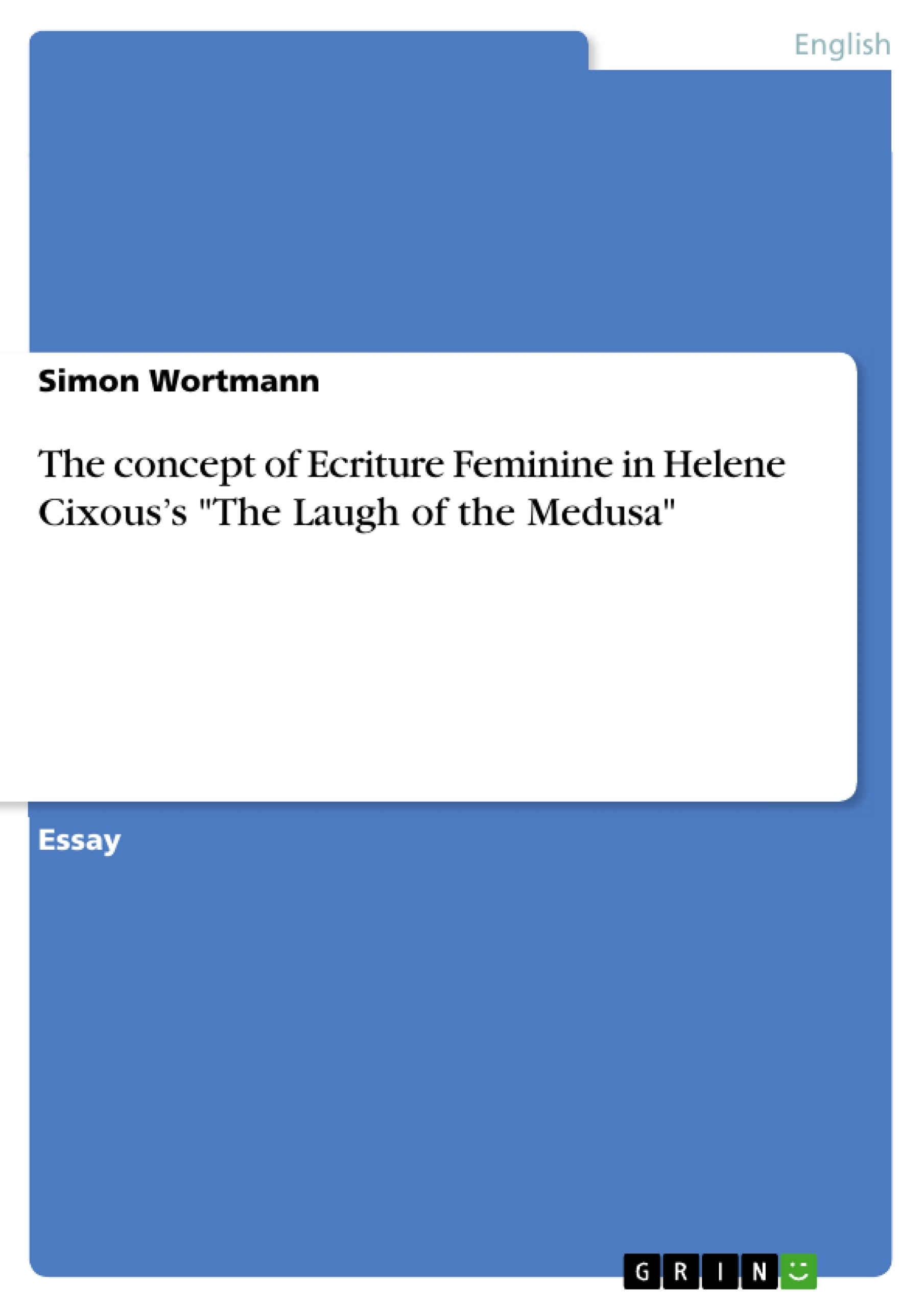In the year 1975 the French feminist author Helene Cixous published an essay called “The
Laugh of the Medusa”. In it, she develops an entirely new theoretical concept with the aim of
giving rise to feminist voice. The central ideas of Ecriture Feminine, literally “women’s
writing”, are going to be presented in this paper. In the first part, a brief description of
Cixous’s intellectual milieu is given in order to show the actual reason that led her to come up
with a new notion of liberating women from patriarchy. In this context, an elaboration on
poststructuralism, the philosophical current Cixous belonged to, follows. Closely related to
that is the authors skepticism towards Sigmund Freud’s language philosophy. Specifically
speaking, Freud’s statements on the penis envy theory. Primary attention is paid to the theory
of phallocentrism, which can be seen as one of the main reasons for Cixous’s writings. For a
better understanding of this term, the concept of logocentrism is also explained, as well.
Logocentrism can be seen as a pillar of the theory of phallocentrism and therefore it deserves
to be mentioned at this point.
In the second part, we deal with the question of what is actually meant by “women’s writing”.
Furthermore, we will analyze which role the female body and sexuality plays in this context.
This excursion is highly interesting as it is crucial for the understanding of her concept. Since
the female body is considered a key for women to resist masculinist thinking and, hence, the
systematic repression of women. Apart from that, we try to show whether features of
Ecriture Feminine are evident in the “The Laugh of the Medusa”. Moreover, a different
viewpoint on Cixous’s theory is shown in the chapter “Criticism” in which arguments for and
against her theory are shown. In point five “Conclusion” the main aspects of this paper are
summed up.
When writing this paper, the main source of information were essays on women’s writing and
French feminist writing, dating from 1987 to 1986. Besides, secondary literature on literary
and cultural theory as well as feminist practice and poststructuralist theory were used. Recent
research on Cixous’s work, however, could not be found. The only source dealing particularly
with her writings dates from 1991.
Table of Contents
- Introduction
- The need of a new feminine way of writing
- The historical context of Cixous's essay
- Helene Cixous as a representative of the poststructuralist movement
- The concepts of Phallocentrism and Logocentrism
- Characteristics of Ecriture Feminine
- Criticism
- Conclusion
Objectives and Key Themes
This paper examines the concept of Ecriture Feminine, as outlined in Helene Cixous's essay "The Laugh of the Medusa," with a focus on liberating women from patriarchal constraints.- The historical context of Cixous's essay and the rise of the French feminist movement.
- Cixous's position within poststructuralist theory and her critique of Freud's penis envy theory.
- The concepts of phallocentrism and logocentrism as key contributors to the marginalization of women in discourse.
- The significance of the female body and sexuality in Ecriture Feminine.
- The potential for Ecriture Feminine to subvert patriarchal systems.
Chapter Summaries
The introduction provides an overview of Cixous's essay, outlining the central themes of Ecriture Feminine and the theoretical framework of poststructuralism. The chapter also briefly describes the historical context of the essay and Cixous's critique of Freud's theories.
The second chapter explores the historical context of Cixous's essay, focusing on the rise of the French feminist movement and the need for a new feminine way of writing. This chapter also examines Cixous's position within poststructuralist theory and her critique of Sigmund Freud's theories, particularly his concept of penis envy. This chapter also delves into the concepts of phallocentrism and logocentrism, which Cixous argues have contributed to the marginalization of women in discourse.
The third chapter examines the characteristics of Ecriture Feminine, including the role of the female body and sexuality in this writing practice. It explores how Ecriture Feminine can be seen as a tool to resist masculinist thinking and challenge the systematic repression of women.
The chapter on Criticism presents a variety of viewpoints on Cixous's theory, offering both arguments for and against her ideas.
Keywords
This paper focuses on the themes of Ecriture Feminine, feminist theory, poststructuralism, phallocentrism, logocentrism, female body, sexuality, and women's writing. The analysis centers on Helene Cixous's essay "The Laugh of the Medusa" and her critique of Freud's theories.- Quote paper
- Simon Wortmann (Author), 2012, The concept of Ecriture Feminine in Helene Cixous’s "The Laugh of the Medusa", Munich, GRIN Verlag, https://www.grin.com/document/212572



